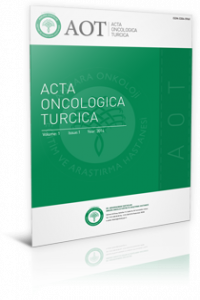Epitelyal Over Karsinomunda İntraperitoneal Kemoterapi sırasında oluşan Peritonovajinal Fistül
İntraperitoneal tedavi; over neoplazmları; peritoneovajinal fistül
Peritoneovaginal Fistula during Intraperitoneal Chemotherapy of Epithelial Ovarian Carcinoma
___
- Armstrong D, Bundy B, Wenzel L, et al. Intraperitoneal Cisplatin and Paclitaxel in ovarian cancer. N Engl J Med. 2006;354:34-43.
- Landrum LM, Gold MA, Moore KN, Myers TK, McMeekin DS, Walker JL. Intraperitoneal chemotherapy for patients with advanced epithelial ovarian cancer: a review of complications and completion rates. Gynecol Oncol. 2008;108:342-7
- Zeimet AG, Reimer D, Radl AC, et al. Pros and cons of intraperitoneal chemotherapy in the treatment of epithelial ovarian cancer. Anticancer Res. 2009;29:2803-8.
- ISSN: 0304-596X
- Başlangıç: 2015
- Yayıncı: Dr. Abdurrahman Yurtaslan Ankara Onkoloji EAH
Osteoporozda Jinekolojik Risk Faktörlerinin Değerlendirilmesi
Öznur UZUN, Kurtuluş KÖKLÜ, Sumru ÖZEL, Alize Yılmaz ŞAHİN, Sibel Ünsal DELİALİOĞLU, Fazıl KULAKLI
Nora Lezyonu; Olgu Sunumu Ve Literatürün Gözden Geçirilmesi
Ercan ŞAHİN, Mahmut KALEM, Yavuz Yener SAĞLIK
İzole Sesil Osteokondrom Zemininde Gelişen Kondrosarkom: Olgu Sunumu
Mahmut KALEM, Reşit SEVİMLİ, Adem ÜNLÜ, Yener SAĞLIK
Epitelyal Over Karsinomunda İntraperitoneal Kemoterapi sırasında oluşan Peritonovajinal Fistül
Umut DEMİRCİ, Havva Yeşil ÇINKIR, Bülent YALÇIN
İntraosseoz Lipomlu Olgularımızdaki Cerrahi Tedavi Sonuçlarımız
Güray TOĞRAL, Murat ARIKAN, Sezgin SEMİS, Fevzi KEKEÇ, Fatih EKŞİOĞLU, Şafak GÜNGÖR
